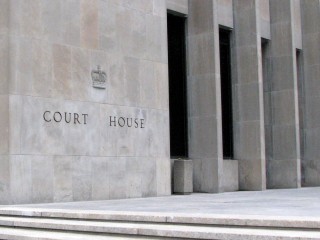As Ontario begins to re-open additional services and begins to implement stage two and eventually stage three protocols for the COVID-19 pandemic, Ontario has extended its state of emergency until July 15, 2020, as of the writing of this article.
For over four months now the COVID-19 global pandemic has been reshaping our lives and the way in which we interact with our family, friends, and the public at large. Face masks, social distancing and hand sanitizing have become the normal practice for the vast majority of us.
However, the risk of exposure by unwarranted or unwanted contact still runs high and is a serious concern to public safety and health.
A serious issue is deliberate spitting and coughing incidents being reported at grocery stores and other Ontario establishments, including a Tim Hortons drive-through. This behavior on a criminal basis may lead to mischief or an assault charge.
However, is there a civil remedy for individuals seriously affected by this behavior?
Spitting as a Battery
In the tort of battery, physically harmful contact is not required. It is also unnecessary that the Defendant intended to harm or injure the Plaintiff. Rather, to be actionable, the contact must be committed intentionally or negligently.
In discussing battery, the following was taken from Bettel et al. v. Yim, 1978 CanLII 1580 (ON SC) [emphasis added]:
…Fleming writes, supra, pp. 23-4:
Of the various forms of trespass to the person the most common is the tort known as battery, which is committed by intentionally bringing about a harmful or offensive contact with the person of another. The action, therefore, serves the dual purpose of affording protection to the individual not only against bodily harm but also against any interference with his person which is offensive to a reasonable sense of honour and dignity. The insult involved in being touched without consent has been traditionally regarded as sufficient to warrant redress, even though the interference is only trivial and not attended with actual physical harm. ”The least touching of another in anger is a battery”, and so is such offensive and insulting behaviour as spitting in another man’s face, cutting his hair or kissing a woman. The element of personal indignity is given additional recognition in the award of aggravated damages to compensate for any outrage to the plaintiff’s feelings …
. . . . .
Battery is an intentional wrong: the offensive contact must have been intended or known to be substantially certain to result. On the other hand, it is not necessary that the actor intended to inflict bodily harm, since we have seen that the legal injury is complete without it. Indeed it may be sufficient that he intended only to frighten but in a manner fraught with serious risk of bodily contact or harm. [Footnotes omitted]
Fleming, in the use of “intent” accepts the definition set out in the Second Restatement of the Law of Torts (1965):
8A. Intent
The word “intent” is used throughout the Restatement of this Subject to denote that the actor desires to cause the consequences of his act, or that he believes that the consequences are substantially certain to result from it.
The Challenge of Damages
Damages awarded in a successful claim for battery vary widely depending on the nature and seriousness of the injury. The most common reliefs sought may include:
- General damages (pain and suffering);
- Past and future out of pocket expenses;
- Past and future medical costs;
- Punitive damages (meant to punish the Defendant rather than compensate the Plaintiff); and
- Aggravated damages (compensation for humiliating, oppressive, and malicious aspects of the defendant’s conduct which aggravate the plaintiff’s suffering. In cases of negligence, aggravating factors can also be taken into account where the defendant’s conduct recklessly disregards the plaintiff’s right.)
General damages in particular are a challenge to consider. On one hand, it may be easy to prove that the Defendant intentionally or negligently spat on the Plaintiff. But prima facie, quantifying the pain and suffering may be a novel argument to present to the courts, especially since COVID-19 affects individuals differently based on their vulnerability factors to the disease. However, even without a confirmed transmission of COVID-19 as a result of the battery, it would be prudent to consider the psychological factors associated with being spat on in light of a COVID-19 fearful world such as:
- Development of anxiety and agoraphobia; and
- The emotional turmoil of needing to be immediately quarantined from family, especially if the Plaintiff is the prime caregiver and/or there is evidence of transmission of Covid-19 by the Defendant’s actions.
Is Pursuing a Battery Claim Worth It?
Another significant issue to consider is the issue of enforceability, and whether or not the Defendant has the assets to actually pay the compensation to the Plaintiff. This may be taken in the form of garnishment of wages, as well as seizure and sale of personal property and/or land. However, if the Defendant has no job or personal property to seize, then they may be considered impecunious or “judgment proof” in the sense that pursuing an action may not be worth the trouble when considering the end result.
If in conjunction with spitting, there is additional behavior or actions from the Defendant that amount to a violent crime conviction, then there may be some relief provided in the form of Ontario’s Victim Quick Response Program.
Final Thoughts
If the Defendant has been charged by the police in a separate criminal charge for nuisance or assault as a result of their spitting and other aggressive behaviour, it may be beneficial to await the results of the criminal case BEFORE launching a civil claim:
- A quick lawsuit may afford a savvy criminal defence lawyer an argument to undermine your credibility as a witness (and thus affect the result of a criminal trial or a civil claim); and
- If convicted, the criminal case and finding of guilt may be useful in supporting the civil claim.
It is also important to note that in most cases, there is a limitation period of 2 years from the date of the incident to commence a civil claim in Ontario. As such, one should not delay too long in bringing an action in court. It is highly recommended to consult with a personal injury lawyer in Ontario to benefit from initial consultation and determine your legal rights before making the decision to pursue an action.
Acknowledgements to Bart Heinen, Paralegal Licensee with Joshua David & Associates Law Firm for the research efforts and co-writing of this blog post.










